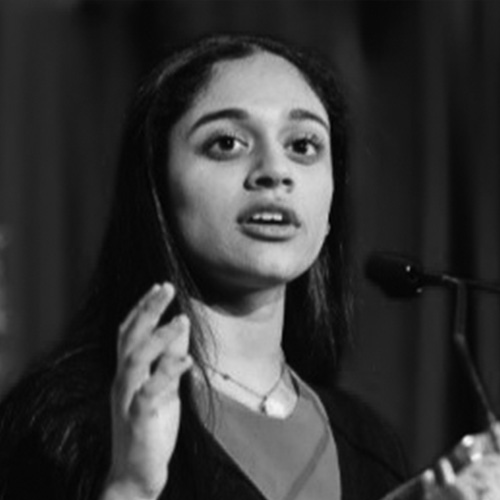The mental health crisis impacting young people today is beyond troubling — and it’s only getting worse.

Solome Tibebu
Founder and CEO, Going Digital: Behavioral Health Tech
“We do not have the ability to solve the youth mental health crisis without having young people at the table, helping us ideate new approaches, develop new models, and create new solutions that can make a scalable impact.”
Between harmful social media interactions, stressful news and events, pressure to conform, and many other socio-economic factors, there’s been a 30% increase in children and adolescents who have anxiety and depression in recent years, and nearly 42% of high schoolers experience persistent feelings of sadness.
This crisis is compounded by limited access to the right type of care. Only half of children with diagnosable mental health problems receive adequate treatment, with a national average of 14 child and adolescent psychiatrists per 100,000 children.
While solutions to this problem are multi-faceted, here’s what I know to be true: We do not have the ability to solve the youth mental health crisis without having young people at the table, helping us ideate new approaches, develop new models, and create new solutions that can make a scalable impact.
A personal mission to foster community
Finding, embracing, and supporting emerging leaders determined to improve mental health care feels personal. My first business endeavor was an online cognitive behavioral therapy app that I secured a small funding round and launched as a junior in college. Frankly, the 20-year-old me had no idea what I was doing, but we persevered, and I learned many valuable lessons working with clinicians, programmers, and patients.
These early, real-life experiences and opportunities eventually led me to a career in consulting. I support private equity firms and M&A transactions across the digital health landscape and serve as an advisor to the Adolescent Mental Health team at Pivotal Ventures, Melinda French Gates’ investment and incubation company focused on accelerating social progress in the United States.
Then March 2020 arrived, and all of the in-person healthcare conferences I was planning to attend were canceled. Knowing the impact community and idea-sharing have within healthcare, I asked friends, clients, and colleagues if they’d be interested in attending a virtual behavioral health summit where everyone (health plans, employers, behavioral health providers, digital health companies, investors, policymakers, etc.) could come together and discuss new technologies and innovations that are helping expand access to mental health. That’s when the Behavioral Health Tech Conference was born.
Now in our third year, we’re launching an awards program at the conference. The Young Innovators in Behavioral Health Awards program shines a light on the critical role young people play in envisioning, designing, and building a future where all people, including children and adolescents, can access the critical mental health resources they need.
Shining a light on emerging leaders
The Young Innovators in Behavioral Health Awards program highlights major breakthroughs, innovations, and contributions from emerging leaders focused on addressing the mental health crisis in America today.
I believe these innovators need a more central role in defining solutions to problems they see play out in their everyday lives — and to get them a seat at the table, it’s critical we bring attention to their ideas and provide them with the resources, guidance, and support they need to introduce and market their solutions.
I’m thrilled to share some of this year’s winners:

Asli McCullers
Health Equity Research Associate, MedStar Health; Graduate Research Assistant, University of Maryland School of Public Health
Asli McCullers is a dedicated health equity researcher who focuses on addressing health challenges marginalized young adults face. Her leadership roles include founding organizations, conducting research studies, and working with various institutions to advance mental health equity and wellness. She is a published author and has engaged in initiatives targeting mental health disparities, reproductive decision-making, and health education.

Bruny Kenou
Co-Founder, DukeLine; Co-Founder, Lay Mental Health Advocates
Bruny Kenou collaborates with policymakers nationwide to create sensible policies that expand access to mental health resources. She’s the co-founder of DukeLine, a texting resource at Duke University that connects students dealing with mental health issues to trained student Peer Coaches for anonymous support. She also founded the Lay Mental Health Advocates program, a collaboration between NIMH, Duke, and Johns Hopkins that trains students and counterparts to advocate for mental health issues.

Stephen Smith
CEO, NOCD
Stephen Smith channeled his personal struggles with finding the treatment he needed to conquer OCD and founded NOCD, a company that provides access to Exposure and Response Prevention (ERP) therapy to help people manage OCD. ERP therapy helps patients confront thoughts and situations that make them anxious and avoid compulsive behavior in response to the situations. Stephen currently serves as CEO of NOCD, which is helping 180 million people with OCD around the world regain their lives.

Shrenik Jain
Founder, Marigold Health
Shrenik Jain recognized a problem he witnessed firsthand as an EMT and turned his passion into action by founding Marigold Health, a tech-enabled services company that brings artificial intelligence and machine learning innovation to the Medicaid Serious Mental Illness population. His solution has been well received by Managed Medicaid plans, which have celebrated the solution for reaching underserved populations.

Trisha Prabhu
Founder and CEO, ReThink
Trisha Prabhu developed an anti-cyberbullying technology to address the widespread issue of online harassment among youth that’s linked to mental health challenges. ReThink‘s approach detects offensive content before it’s sent and offers users a chance to reconsider, effectively reducing cyberbullying incidents by over 93%. Trisha’s work has reached a global scale, promoting change and collaboration across healthcare, technology, and advocacy sectors.
We’re immensely proud of this year’s 30 winners. Their drive and determination to make a positive, scalable change for young people navigating mental health challenges is nothing short of incredible.
You can learn more about the winners here. Winners will be celebrated on stage during an awards ceremony at the Behavioral Health Tech Conference on Nov. 15 in Phoenix, Ariz.

